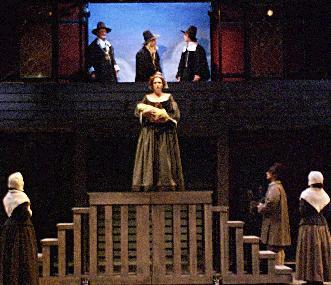Thursday, September 17, 2009
Question 15
Explain the development of a particular theme throughout the novel. Trace this theme through characters, events, and symbolism.
Question 14
Explain the effect of the Puritan setting on the plot of the novel and what you believe to be Hawthorne's attitude toward the Puritan view of morality.
Question 13
Brainstorm a list of female protagonists from movies or other works of literature. What are the qualities they most commonly possess? Does Hester Prynne possess these traits? What comment does that make upon the expectations society has of women?
Question 12
The townspeople present at the minister's revelation do not agree on exactly what they saw on the scaffold nor its significance. When have you interpreted an event differently from others? How can you account for differing views in your personal experiences? How can you account for them in the novel?
Question 11
Hawthorne paints a pessimistic picture of the role of women in Puritan society. Does he strike you as an advocate of women's rights? IDo any of Hawthorne's observations on this issue apply to today's society?
Question 10
Chapter 17 provides readers with their first glimpse into the couple's perspective on their indiscretion. How do they view it after seven years?
Question 9
Dimmesdale says "Of penance, I have had enough! Of penitence, there has been none!" Explain how penance and penitence are different. What penance has the minister undergone?
Question 8
How is the forest with its many elements- sunlight, brook, and wind-blown trees- symbolic of the lives of Hester and Pearl?
Question 7
"The scarlet letter had not done its office." This statements appears at the end of chapter 13. Review the paragraphs that precede it. What is Hester's state of mind. What do you think Hawthorne means by that statement?
Question 6
Having now seen Hester and the minister in a more intimate setting, what is your prediction for their success as a couple?
Question 5
Dimmesdale's room is hung with tapestries depicting the Biblical story of David, Bathsheba, and Nathan the Prophet. King David commits adultery with Bathsheba. He then orders that her husband be sent to certain death in battle. Nathan warns the King that he will be punished.
Why is it ironic that these scenes decorate Dimmesdale's rooms? What effects is the constant sight of them likely to have on the minister's sensibilities?
Why is it ironic that these scenes decorate Dimmesdale's rooms? What effects is the constant sight of them likely to have on the minister's sensibilities?
Friday, September 11, 2009
Question 4
"But sometimes...she felt an eye- a human eye- upon her ignominious brand, that seemed to give a momentary relief, as if half of her agony was shared. The next instant, back it all rushed again...for, in that brief interval, she had sinned anew."
In this passage, whose "human eye" does Hester feel? What is meant by Hester "had sinned anew"?
In this passage, whose "human eye" does Hester feel? What is meant by Hester "had sinned anew"?
Question 3
In chapter 2, Hester thinks of her childhood home as she stands on the scaffold. What does this glimpse of her past suggest about her family background?
Question 2
"In our nature, however, there is a provision, alike and marvelous and merciful, that the sufferer should never know the intensity of what he endures by its present torture, but chiefly by the pang that rankles after it." (Ch. 2)
What does this passage mean? Do you agree? Why or why not? What experience(s) in your life has been, to a degree, like this?
What does this passage mean? Do you agree? Why or why not? What experience(s) in your life has been, to a degree, like this?
Question 1
"The founders of a new colony, whatever Utopia of human virtue and happiness they might originally project, have invariably recognized it among their earliest practical necessities to allot a portion of the virgin soil as a cemetery and another portion as the site of a prison." (Ch. 1)
Restate this passage in your own words. What comment does this passage make about human nature?
Restate this passage in your own words. What comment does this passage make about human nature?
Subscribe to:
Posts (Atom)

